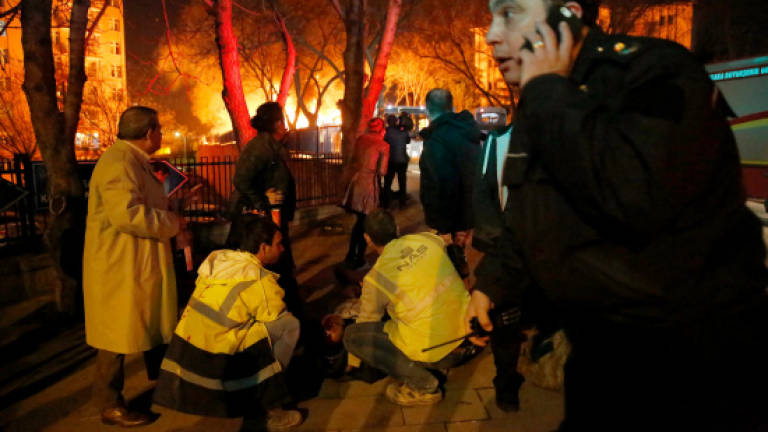Syrian Kurdish PYD denies Ankara attack responsibility that killed 28

BEIRUT: The head of the Syrian Kurdish Democratic Union Party on Thursday denied Turkish allegations that the group was involved in a car bombing targeting a military convoy in Ankara that killed 28 people.
"We deny any involvement in this attack," Saleh Muslim told AFP, after Turkey's prime minister accused the party's armed wing of carrying out the attack in coordination with the Kurdistan Worker's Party, an outlawed Kurdish group in Turkey.
The massive car bomb struck five buses carrying military service personnel when it stopped at a red traffic light in the centre of the capital on Wednesday evening. Sixty-one people were wounded.
It was latest in a string of deadly strikes that have rocked Turkey since last summer and one of the deadliest assaults targeting the military in the Nato member state in recent years.
Also Thursday, at least six soldiers were killed in an attack on their convoy in southeastern Turkey blamed on Kurdish militants, security sources said.
Prime Minister Ahmet Davutoglu said the Ankara attack was carried out by operatives of the outlawed Kurdistan Workers' Party (PKK) in cooperation with the Syrian Kurdish People's Protection Units (YPG).
"It has with certainty been revealed that this attack was carried out by members of the terrorist organisation in Turkey in cooperation with a YPG member who infiltrated from Syria," Davutoglu told reporters.
"The attack has direct links with YPG."
He said the bomber was a Syrian national named Salih Necar and that nine people had been detained over the attack.
Davutoglu vowed to make the culprits "pay a price," saying Turkey would take any kind of measure on its border including self-defence.
New strikes on north Iraq
Hours after the attack, Turkey's air force launched new strikes on PKK targets in northern Iraq, acting on intelligence that there were dozens of fighters including top rebel leaders in the area, the army said.
Davutoglu said 70 fighters had been killed in the strikes.
Turkey both considers both the PKK and YPG to be terror groups, in contrast to the United States which only classifies the PKK as a terror organisation and works closely with the YPG as an effective force fighting jihadists in Syria.
The attack struck the heart of power in the Turkish capital in an area where the headquarters of the army, the parliament and prime minister's offices are in close proximity.
Pictures showed that at least two of the vehicles had been reduced to burned out wrecks and the massive blast was heard from all over the city, causing panic among locals.
Police identified the bomber from fingerprints taken from refugees who crossed the border to escape the war in Syria, the strongly pro-government Yeni Safak and anti-government Sozcu daily said.
The YPG and its political wing the Democratic Union Party (PYD) deny being PKK branches and argue they have no interest in attacking Turkey.
PYD head Saleh Muslim on Thursday denied any responsibility for the Ankara attack.
Turkey has for five consecutive days shelled Syrian Kurdish targets inside Syria, saying the military was responding to incoming fire.
Turkey fears the Syrian Kurds want to carve out a continuous autonomous region across the border in northern Syria stretching from the Iraqi border almost to the Mediterranean.
Ankara is concerned the Kurds will now take a "corridor" east of the flashpoint border town of Azaz — currently still in control of rebels — to link up two Kurdish-held areas.
'Shoulder to shoulder'
The bombing prompted Davutoglu to scrap a planned trip to Brussels on Thursday to discuss Europe's migrant crisis. President Recep Tayyip Erdogan also shelved a trip to Azerbaijan.
The United States strongly condemned "the terrorist attack on Turkish military personnel and civilians" and reaffirmed US solidarity with its key Nato partner.
Nato chief Jens Stoltenberg also said the alliance strongly condemned the bombing, adding: "Nato allies stand shoulder to shoulder in the fight against terrorism."
The EU pledged to stand "with Turkey and its people in these difficult times".
Turkey has in the last months waged an all-out assault on the PKK, which has repeatedly attacked members of the security forces with roadside bombings on their convoys in the southeast.
The PKK launched an insurgency against the Turkish state in 1984, initially fighting for Kurdish independence although now more for greater autonomy and rights for the country's largest ethnic minority.
Ankara was already on alert after 103 people were killed on Oct 10 when two suicide bombers blew themselves up in a crowd of peace activists, the bloodiest attack in the country's modern history.
Eleven people, all German tourists, were also killed on Jan 16 when a suicide bomber blew himself up in the tourist heart of Turkey's biggest city, Istanbul.
Those attacks were blamed on Islamic State jihadists, as were two other deadly bombings in the country's Kurdish-dominated southeast earlier in the year. — AFP